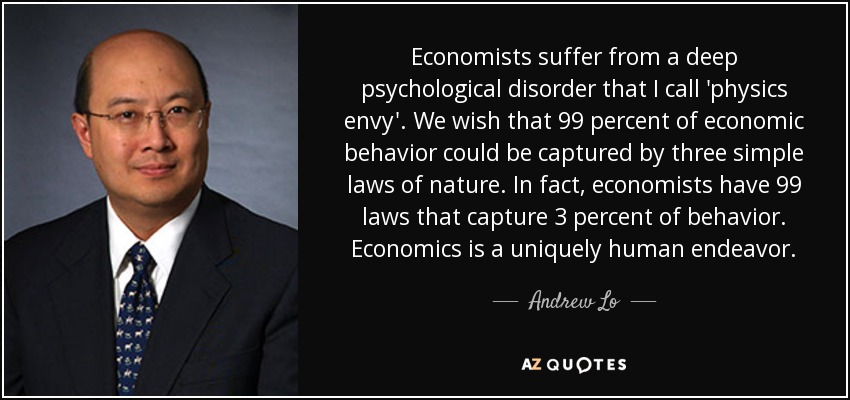Dangerous physics envy in economics Unlike in physics, there are no universal and immutable laws of economics. You can’t will gravity out of existence. But as the recurrence of speculative bubbles shows, you can unleash ‘animal spirits’ so that human behaviour and prices themselves defy economic gravity. Change the social context – in economic parlance, change the incentive structure – and people will alter their behaviour to adapt to the new framework … The apogee of economic ‘scientism’ came in the 1990s … Hindsight has revealed the misplaced hubris of that decade, one during which Greenspan helped to fuel a speculative bubble that nearly destroyed the world economy, and the Soviet Union’s failed reform knocked seven years off its life expectancy.
Topics:
Lars Pålsson Syll considers the following as important: Economics
This could be interesting, too:
Lars Pålsson Syll writes Schuldenbremse bye bye
Lars Pålsson Syll writes What’s wrong with economics — a primer
Lars Pålsson Syll writes Krigskeynesianismens återkomst
Lars Pålsson Syll writes Finding Eigenvalues and Eigenvectors (student stuff)
Dangerous physics envy in economics
Unlike in physics, there are no universal and immutable laws of economics. You can’t will gravity out of existence. But as the recurrence of speculative bubbles shows, you can unleash ‘animal spirits’ so that human behaviour and prices themselves defy economic gravity. Change the social context – in economic parlance, change the incentive structure – and people will alter their behaviour to adapt to the new framework …
The apogee of economic ‘scientism’ came in the 1990s … Hindsight has revealed the misplaced hubris of that decade, one during which Greenspan helped to fuel a speculative bubble that nearly destroyed the world economy, and the Soviet Union’s failed reform knocked seven years off its life expectancy. Many economists, Sachs included, defend themselves on the grounds that their advice was not actually taken: bad politics got in the way of good economics.
Given this willful blindness, the current reaction against economists is understandable. In response, a ‘data revolution’ has prompted many economists to do more grunt work with their data, while engaging in public debates about the practicality of their work. Less science, more social. That is a recipe for an economics that might yet redeem the experts.

